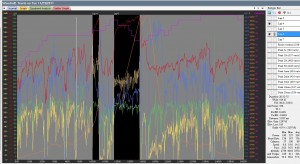Make 2012 your best season!
Plan to make your 2012 season the best one yet. Recently I wrote this article for MTBRaceNews.com. You can read the article as published here, or simply read below for the full version. Hopefully the article will raise a question or two, so let me know if I can help you further with more information.
Question: “I know I don’t need to be training on the bike right now but what are some things I should be doing to stay in shape and ensure that I have a great 2012 race season?”
Thanks for the question! The cross training that you are doing now likely won’t have a big impact on your 2012 race season. Cross training will help keep you generally fit and ready to train, but it’s not likely to help you in the going faster department – to get faster you have to ride more and ride faster. The ‘off-season’ is the single longest period of time that you can use to boost your fitness for the season ahead, but you’ve got to do this work on your bike. Don’t despair however, because it’s important to take a break too. As long as you’re having fun and keeping active your cross training will do its trick for the time being.
Now happens to be a great time to get away from the bike especially if your first high priority races might be sometime in the April or May window. There are some important things that you can (and should) be doing while you’re not turning the cranks. Let’s focus on what you can do while taking a hard earned break from the bike.
Outline the 2012 racing schedule
Outlining your race schedule is the basic first step. Which races do you plan to attend and which are those that you really want to do well at? Write them all down and make note of each race’s importance in the grand scheme of your season. This overview can always be adjusted, but it’s helpful to have a template to start with.
Evaluate and change your training routine
In order to maximize your bike training you need to take a close look at your normal day to day schedule. How well did you balance your training with your other responsibilities during 2011? Modify your weekly schedule so that both ‘real life’ and your riding can benefit. Perhaps planning for two or three days of no riding each week will allow you to train more and with better quality on the other days. If you typically ride in the evenings, consider doing some of your training in the morning. This can free up your evening (bonus family time and/or less stress about getting out of work late) or it can allow you to double up and put in a little more training volume, thus adding to the workload you’re able to do in a given week.
Plan for better recovery too
As important as it is to balance life’s responsibilities with training, it is equally important to plan for good rest and recovery. How much sleep are you getting each night? Chances are you’ll train and race better with more of it. Adjust your evening schedule so that it might allow you to have a consistent bed time and a little extra slumber time. Evaluate what might be some of life’s biggest stresses and put some time and energy into them so that they might become less stressful. Also, how restful are your ‘rest days’? Make them count just as much as your hardest training days do.
Kick start your bike season a little earlier
Use your off-season as a great opportunity to generally catch up, evaluate things, and then prepare to implement changes once you resume training. If your goal is to make 2012 better than the other years, I’ll encourage you to start your training a little sooner rather than later relative to what you’ve done before. The indoor trainer won’t replace singletrack, but it will certainly allow you to boost fitness for the season to come.
If you’re looking for an early season escape from the snow and cold, I’d encourage you to plan a training camp in a warmer location. After taking a wintertime break, a training camp is an excellent way to refocus and get things started right for the new season. This can be a great chance to put in some bigger miles and catch up on some extra rest and relaxation. Perhaps your teammates would be interested to do a camp with you, or you can consider joining Brian Matter and I at our Tucson Training Camp January 17-22, 2012. We’ll be doing some great rides and helping riders like you sort out their season plans.
Wrapping it up
The most beneficial things that you can do during your break aren’t cross training related at all. Invest the time to evaluate the bigger picture and figure out how your training and recovery might be able to work better with everyday life this season. If you can do this, your training and racing will be better than ever. While not training this time of the year, be sure to enjoy your time away from the bike. Keep active, have fun in the snow, and plan ahead for a bigger and better season in 2012. When you’re ready to go, all you’ll have to do is go for it!

